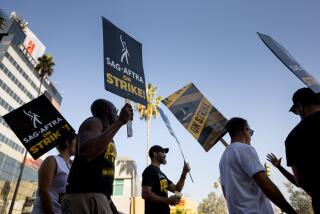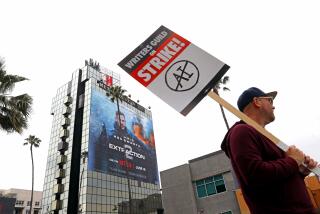RIAA Reaches Deal on Royalties
- Share via
The Recording Industry Assn. of America reached a long-awaited royalties deal Thursday with a leading group of online music companies, setting the fees that the companies’ Internet radio services will pay to record labels and artists for the next two years.
The deal brings a truce in a bitter fight between the Webcasters, which claimed that onerous royalties were killing their business, and the music industry, which argued that Internet radio shouldn’t be subsidized by artists and labels.
It also could avert another costly arbitration such as the one that helped set the previous royalty rate of 0.07 cent a song for each listener. That rate expired at the end of last year. Both sides urged the U.S. Copyright Office to bless the deal and cancel the pending arbitration for commercial Webcasters.
John L. Simson, executive director of SoundExchange, the RIAA’s royalties arm, said he hopes a deal is reached soon with noncommercial Webcasters, such as college Internet radio stations. Arbitration may still be needed for Internet “simulcasts” by over-the-air radio stations, or for commercial broadcasters that object to Thursday’s deal.
The agreement was negotiated primarily by the RIAA and seven Webcasters, including Microsoft Corp., AOL Time Warner Inc., RealNetworks Inc. and Yahoo Inc.
Although the agreement doesn’t provide much of a financial break to the Webcasters, it does give them far more flexibility than they had under the royalty rates set last year. Webcasters can pay about 0.07 cent a song for each listener or about 1 cent for each hour, or pay about 11% of the revenue from subscription services.
Zack Zalon of Radio Free Virgin, the online radio service affiliated with Richard Branson’s Virgin Group, said the deal was great news even though both sides came away with less than they wanted. “I really do believe that it points to the fact that the record labels ... and content providers such as ours are starting to see things from a similar point of view,” he said.
Still, several top Webcasters said they weren’t happy about the deal, which requires them to pay significantly higher royalties than other radio and digital music services do. The problem, they said, is that the arbitration process Congress set up in 1998 sets a different standard for Webcasters than for many of their competitors.
“I think people would characterize this as a Hobson’s choice,” said Jonathan Potter of the Digital Media Assn. trade group. “One could spend millions of dollars in a miserable process that’s known to yield bad results, or one could do a stopgap deal and await congressional legislation that might create a better process and better standards for the future.”
Rep. Lamar S. Smith (R-Texas), who chairs a House Judiciary subcommittee, introduced a bill last month with Rep. Howard L. Berman (D-Mission Hills) and John Conyers Jr. (D-Mich.) to overhaul the arbitration process. The bill doesn’t address the standards used for setting rates, however, and some Webcasters fear that Thursday’s deal will reduce the pressure on Congress to change the system.
More to Read
The biggest entertainment stories
Get our big stories about Hollywood, film, television, music, arts, culture and more right in your inbox as soon as they publish.
You may occasionally receive promotional content from the Los Angeles Times.











